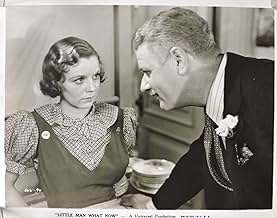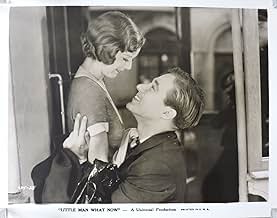Ajouter une intrigue dans votre langueA young couple struggling against poverty must keep their marriage a secret in order for the husband to keep his job, as his boss doesn't like to hire married men.A young couple struggling against poverty must keep their marriage a secret in order for the husband to keep his job, as his boss doesn't like to hire married men.A young couple struggling against poverty must keep their marriage a secret in order for the husband to keep his job, as his boss doesn't like to hire married men.
Histoire
Le saviez-vous
- AnecdotesThe film takes place from 1930 to 1932.
- ConnexionsReferenced in Wake Up and Dream (1934)
Commentaire à la une
This is the story of a young German couple, Emma (Margaret Sullavan) and Hans (Douglas Montgomery), struggling to get by in Weimar Germany with a Depression going on. It reminds me of "Made for Each Other" starring James Stewart and Carole Lombard made in 1939.
Hans and Emma are unmarried and facing an accidental pregnancy. They get an appointment with a doctor where it is implied that they can get an abortion. But the doctor refuses, and having no other "references" of doctors who are trustworthy in this matter, they get married and decide to have the baby.
They face a multitude of problems, the first being that Hans is one of three men his employer has hired with the strict rule that none of the men be married. The reason is that said employer has a homely daughter of marriageable age and he is trying to foist her off on one of them. And said homely daughter has decided that Hans is the man she wants. That leads to unemployment for Hans, but not the way you think. Then they decide to move in with Hans' well off stepmother, but she sees Emma as her personal servant, and then it is discovered that dear old stepmom is running a brothel from her house when Hans is away during the day.
The two just encounter a raft of cold heartless employers that use the hard times to make ridiculous demands on their employees. It's not like any of this has any parallels in today's world right? But along the way the couple does meet some kind people or else this story would just be too depressing.
The turbulent political times are mentioned too, as Hans and Emma keep running into a penniless Marxist couple that is homeless and often hungry.
Frank Borzage spent his entire life in the United States, but his parents were both from Central Europe. I guess it is from the tales they told him that he learned enough about the place that his films set in post WWI Europe ring so true. As for the romantic angle in this film, Borzage was in a marriage in which the love was strictly one way. His wife did not care for him at all. Maybe some of the optimism and romanticism found in his films is rooted in his hope that somehow his own marriage would eventually work out.
Hans and Emma are unmarried and facing an accidental pregnancy. They get an appointment with a doctor where it is implied that they can get an abortion. But the doctor refuses, and having no other "references" of doctors who are trustworthy in this matter, they get married and decide to have the baby.
They face a multitude of problems, the first being that Hans is one of three men his employer has hired with the strict rule that none of the men be married. The reason is that said employer has a homely daughter of marriageable age and he is trying to foist her off on one of them. And said homely daughter has decided that Hans is the man she wants. That leads to unemployment for Hans, but not the way you think. Then they decide to move in with Hans' well off stepmother, but she sees Emma as her personal servant, and then it is discovered that dear old stepmom is running a brothel from her house when Hans is away during the day.
The two just encounter a raft of cold heartless employers that use the hard times to make ridiculous demands on their employees. It's not like any of this has any parallels in today's world right? But along the way the couple does meet some kind people or else this story would just be too depressing.
The turbulent political times are mentioned too, as Hans and Emma keep running into a penniless Marxist couple that is homeless and often hungry.
Frank Borzage spent his entire life in the United States, but his parents were both from Central Europe. I guess it is from the tales they told him that he learned enough about the place that his films set in post WWI Europe ring so true. As for the romantic angle in this film, Borzage was in a marriage in which the love was strictly one way. His wife did not care for him at all. Maybe some of the optimism and romanticism found in his films is rooted in his hope that somehow his own marriage would eventually work out.
Meilleurs choix
Connectez-vous pour évaluer et suivre la liste de favoris afin de recevoir des recommandations personnalisées
Détails
- Date de sortie
- Pays d’origine
- Langue
- Aussi connu sous le nom de
- Little Man, What Now?
- Lieux de tournage
- Société de production
- Voir plus de crédits d'entreprise sur IMDbPro
- Durée1 heure 38 minutes
- Couleur
- Rapport de forme
- 1.37 : 1
Contribuer à cette page
Suggérer une modification ou ajouter du contenu manquant

Lacune principale
By what name was Et demain? (1934) officially released in Canada in English?
Répondre




































